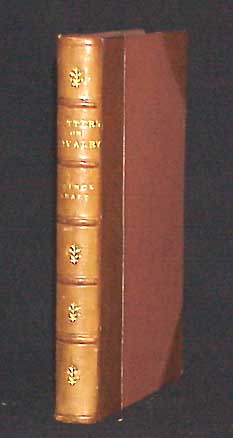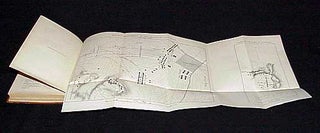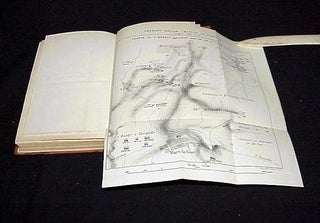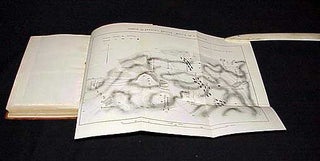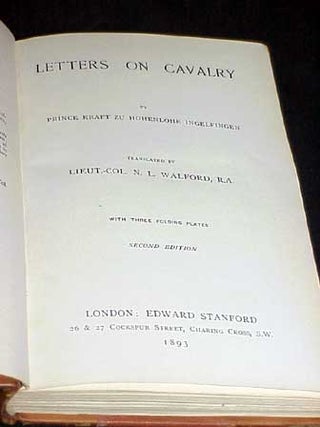Letters on Cavarly
London. Esward Stanford. 1893. The Second Edition. Illustrated with three fold-out strategic plans of mounted attack. 12mo. Handsomely bound in 3/4 blind ruled calfskin and cloth covered boards. Gilt tooled motifs to spine compartments. Raised bands. Gilt titles. Marbled endsheets. t.e.g.
KRAET, prince of Hohenlohe-Ingelfingen (1827—1892), soldier and military writer, son of Prince Adolf of HohenloheIngelfingen (1797—1873), was born at Koschentin in Upper Silesia. He was a nephew of the Prince Hohenlohe noticed above, who commanded the Prussians at Jena. Educated with great rigour, owing to the impoverishment of the family estates during the Napoleonic wars, he was sent into the Prussian army, and commissioned to the artillery at the least expensive arm of the service. He joined the Prussian Guard artillery in 1845, and it was soon discovered that he had unusual aptitudes as an artillery officer. For a time his brother officers resented the presence of a prince, until it was found that he made no attempt to use his social position to secure advancement. After serving as a military attaché in Vienna and on the Transylvanian frontier during the Crimean War, he was made a captain on the general staff, and in 1856 personal aide-de-camp to the king, remaining, however, in close touch with the artillery. In 1864, having become in the meanwhile successively major and lieut.colonel, he resigned the staff appointments to become commander of the new Guard Field Artillery regiment and in the following year he became colonel. In 1866 he saw his first real active service. In the hold advance of the Guard corps on the Austrian right wing at Koniggratz (see SEVEN WEEKS’ WAR), he led the Guard reserve artillery with the greatest dash and success, and after the short war ended he turned his energies, now fortified by experience, to the better tactical training of the Prussian artillery. In 1868 he was made a major-general and assigned to command the Guard artillery brigade. In this capacity he gained great distinction during the Franco-German war and especially at Grai. elotte and Sedan; he, was in control of the artillery attack on the fortifications of Paris. In 1873 he was placed in command of an infantry division, and three years later was promoted lieutenant-general. He retired in 1879 was made general of infantry in 1883 and general of artillery
in 1889. His military writings were numerous, and amongst them several have become classics. These are Briefe über Artillerie (Eng. trans. Letters on Artillery, 1887); Briefe über Strategie (f877; Eng. trans. Letters on Strategy, 1898); and Gesprache uber Reiterei (1887; Eng. trans. Conversations on Cavalry). The Briefe uber Infanterie and Briefe iiber Kavallerie (translated into English, Letters on Infantry, Letters on Cavalry, 1889) are of less importance, though interesting as a reflection of prevailing German ideas. His memoirs (Aus meinem Leben) were prepared in retirement near Dresden, and the first volume (1897) created such a sensation that eight years were allowed to elapse before the publication was continued. Prince Kraft died near Dresden on the 16th of January 1892. (C. F. A.)
A bit of rubbing and the mildest of occassional light soiling to covers, else a Fine ,crisp copy.
Item #7040
Price: $185.00

